Woodside plans to drill up to 80 gas wells along the coast of WA in some of the world’s most biodiverse waters - including 50 wells around Scott Reef.
Right now the Federal Government is considering whether to approve this massive gas project that would do unthinkable harm to our oceans and our climate.
Pristine coral reefs, pygmy blue whales, endangered turtles and countless other marine life in Western Australia's oceans are all at risk - and we only have a few months to make sure the government makes the right decision!
Sign the petition now to tell Woodside to stop its dangerous gas project.
Sign the petition
Join the campaign and protect our oceans and climate from Woodside’s dirty gas.
0 signatures. Help us get to 500000!
Petition | Stop Woodside
By signing this petition you give permission for Greenpeace Australia Pacific to contact you with campaign updates. Your information is safe and secure with us – for more information please see our privacy policy
Woodside’s climate wrecking gas expansion
Threatens marine parks and protected areas
The Burrup Hub – which includes the Scarborough, North West Shelf, and Browse projects – could impact 12 different marine parks, including Ningaloo Reef. It would put marine life at risk and lock Australia into more fossil fuels as the rest of the world shifts to cleaner, cheaper renewable energy.
6.1 billion tonnesOver its lifetime, the Burrup Hub will belch out 12 years of Australia’s emissions |
|
54 threatened speciesDredging, drilling and seismic testing put vulnerable marine species, like whales and turtles, at risk |
Frequently Asked Questions about Woodside’s gas project
Yes. Gas is a polluting fossil fuel that is responsible for climate change. It contains large amounts of methane, one of the most potent greenhouse gasses which traps 86 times more heat than carbon dioxide.
The latest Intergovernmental Panel on Climate Change (IPCC) report found that the world already has enough fossil fuel infrastructure to push us over 1.5˚C. To stave off the worst effects of climate change for people and nature, we must cut down our emissions and transition to clean energy – fast. Yet the Burrup Hub, if completed, would add 6.1 billion tonnes of climate pollution: 12 times Australia’s annual emissions.
Woodside wants to drill over 80 gas wells in some of the world’s most biodiverse waters. If an accident were to take place, it could impact up to 12 marine parks including Ningaloo Reef.
Woodside’s dredging and drilling would cut through whale migration routes and harm nesting sites for endangered sea turtles. Seismic surveying would blast sound waves through the ocean, injuring whales and dolphins. A worst-case scenario spill at Browse could decimate corals at Australia’s magnificent Scott Reef, and reach as far as Indonesian waters. And the risks go on and on.
You can explore the habitat at risk in our Interactive Map and learn more about Woodside’s track record of accidents and degrading infrastructure.
Putting more money in fossil fuels is "moral and economic madness," according to the UN Secretary General. As we move to a lower emissions world, Woodside’s projects risk losing money and becoming stranded assets.
The International Energy Agency (IEA) in its Net Zero by 2050 emissions scenario has modeled a rapid drop in gas demand starting in 2030 – with a steep decline in Australia’s LNG exports. Yet the Burrup Hub would produce gas until 2070.
Investors are losing confidence. In 2022, Australian industry superannuation fund NGS shed $75 million in Woodside shares due to stranded asset risk, while half of Woodside’s own shareholders (49%) voted against the company’s climate plan.
See our Woodside Investor Briefing for more on the financial risks and get in touch if you’re a Woodside shareholder wanting to help
Greenpeace Australia Pacific is helping build a people-powered movement big enough to take on Woodside. And every day, we’re doing the legal and regulatory work behind the scenes to make sure the dangerous Burrup Hub is never completed.
Already, with our allies, we have pushed back seismic testing on Scarborough, exposed the risks to wildlife and climate with peer-reviewed research on the projects, and pressured Woodside Directors and federal and state Environment Ministers to abandon the project.
But we still need more people with us to stop the Burrup Hub from ever being built. Will you join us? Explore the actions below to see how you can help
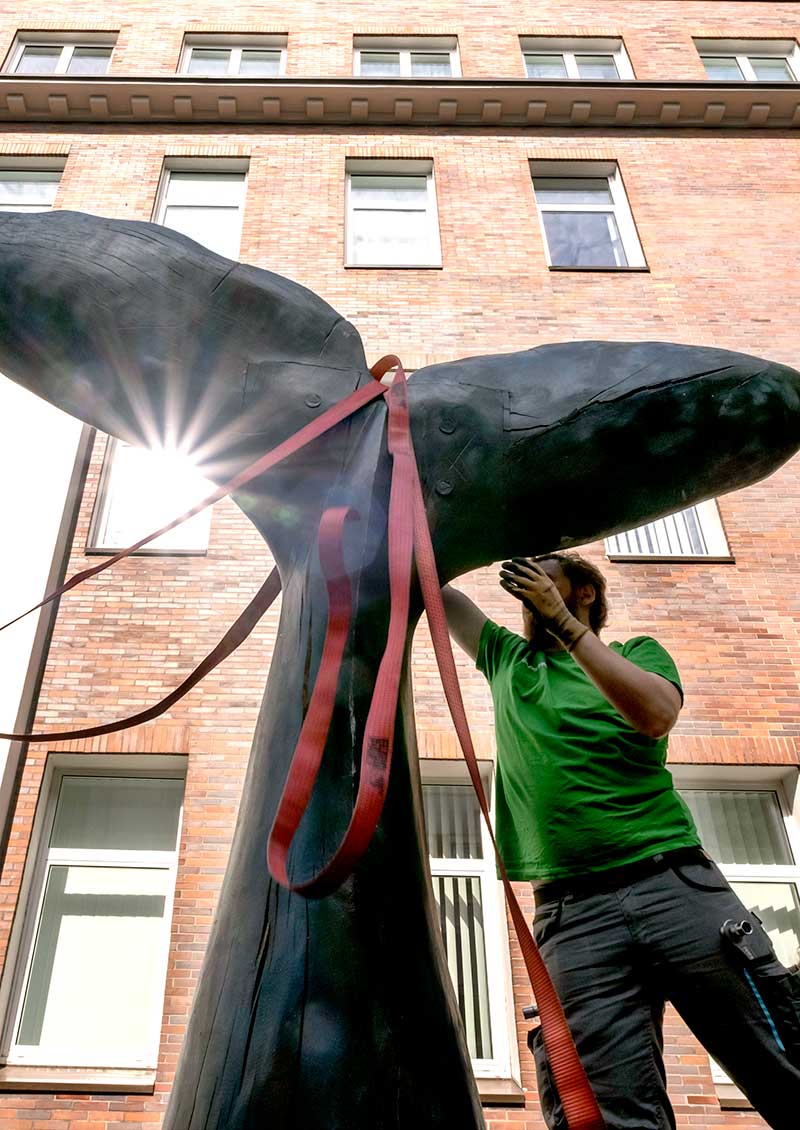
Other ways you can help

Tell your MP you want Woodside out of our oceans
Make sure the government pulls the plug on Woodside’s disastrous plans.

#FreeTheNippers
Help the grassroots campaign in Western Australia to #FreetheNippers from dirty fossil fuel sponsorship!

Let us know if you’re a Woodside shareholder
Big or small, investors can help push for change

Join a Greenpeace Hubs Group
Become a volunteer and get trained up
More information about Woodside's polluting gas project
Explore our reports and briefings to learn more about the risks from Woodside's Burrup Hub gas project.

Investor Briefing: 2023 Greenpeace Woodside Investor presentation

Seismic Report:
Woodside's Dangerous Seismic Plan

Whale's Report: Whales, Woodside and the Dangers of the Burrup Hub

Disaster Report: Deep-Sea Disaster: Why Woodsides Burrup Hub project is too risky to proceed

Spill Mapping: Woodside’s Burrup Hub spill and accident scenarios based on Woodside’s own documents
Recent articles by Greenpeace
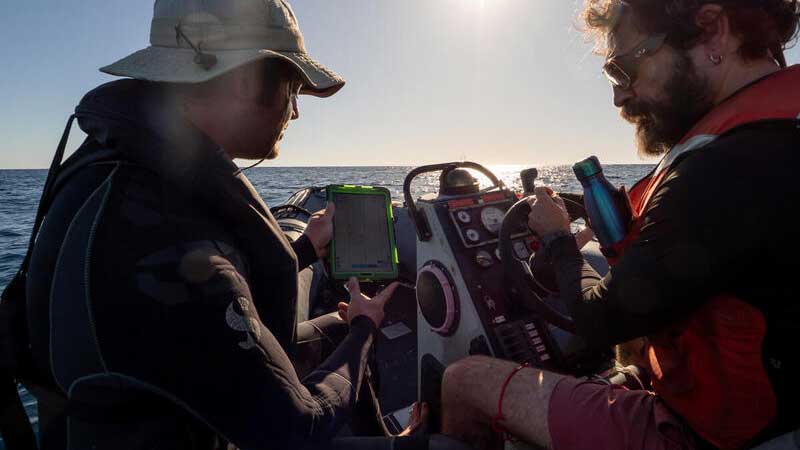
19 May 2023
Looking for Griffin
We set off at 7am, a little after sunrise. The waters were surprisingly calm - unlike my stomach, which was churning with excitement. We were looking for something no one had seen for a decade: a massive riser turret mooring, the size of an apartment block. For 25 years, it had been used to exploit an oil and gas field off the coast of Western Australia.

19 May 2023
Looking for Griffin
We set off at 7am, a little after sunrise. The waters were surprisingly calm - unlike my stomach, which was churning with excitement. We were looking for something no one had seen for a decade: a massive riser turret mooring, the size of an apartment block. For 25 years, it had been used to exploit an oil and gas field off the coast of Western Australia.
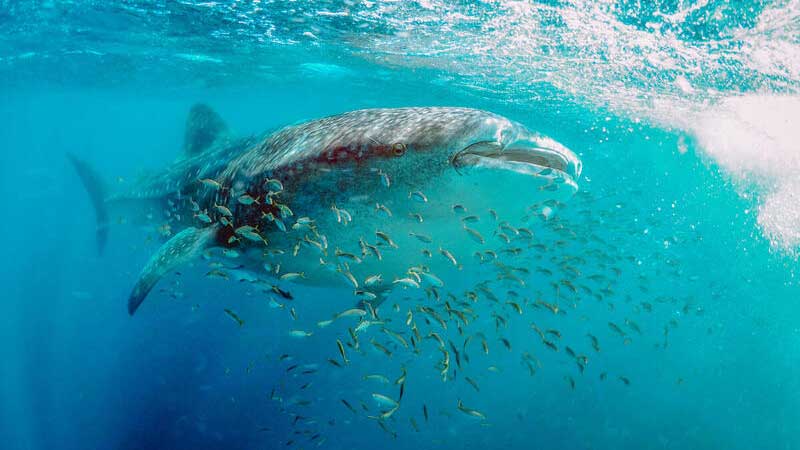
17 May 2023
Ningaloo Reef is a World Heritage treasure
The whale shark, the world’s biggest fish, is what draws people to UNESCO World Heritage-listed Ningaloo Marine Park. These gentle giants congregate at Ningaloo, nestled on the Western Australian coastline near Exmouth, between March and August each year, thrilling thousands of visitors and fuelling the area’s booming tourism industry.
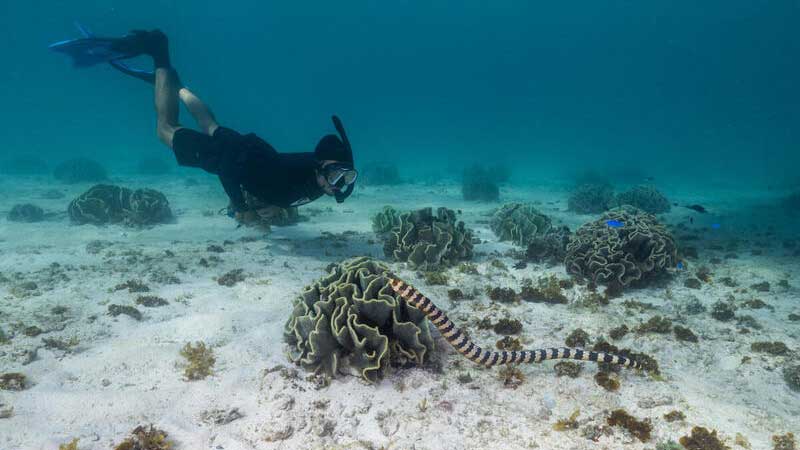
10 May 2023
Welcome to Shark Bay
Shark Bay, located at the most westerly point of Australia, is one of a handful of marine World Heritage sites across the globe. It’s home to some of the planet’s most extraordinary creatures, including the oldest lifeforms on Earth, as well as dugongs, turtles and, of course, sharks.
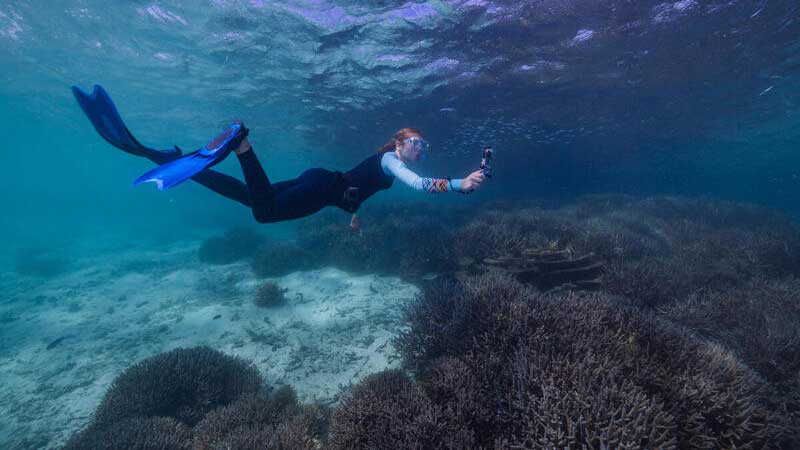
5 May 2023
The Abrolhos Islands: Coral Refuge
Often described as the Galapagos Islands of the Indian Ocean, there are few places in Australia wilder than the remote Houtman Abrolhos Islands, a marine archipelago of 210 islands off the coast of Geraldton, Western Australia.
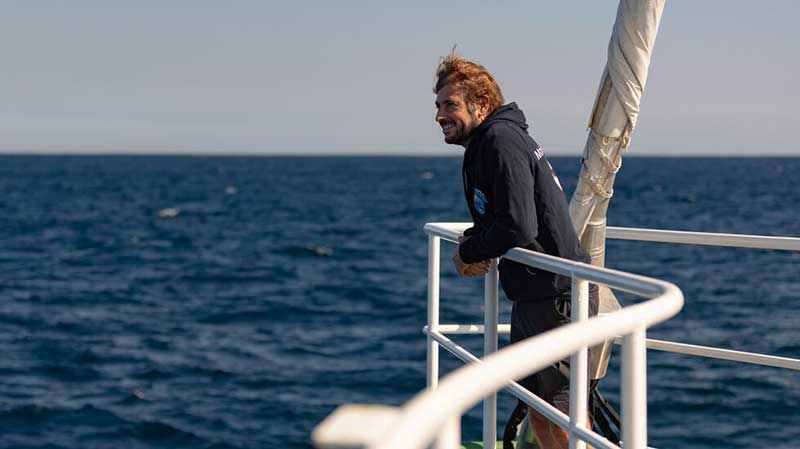
5 May 2023
Whale Spotting in Perth Canyon with Dr Olaf Meynecke
Most tourists who visit Perth make it out to Rottnest Island to visit the cute quokkas and marvel at the island’s lonely wind turbine, which once attracted the wrath of former Prime Minister Tony Abbott. But just beyond Rottnest lies a much less-explored region - Perth Canyon, one of the best places in the world to spot the endangered blue whale, the largest animal on the planet.
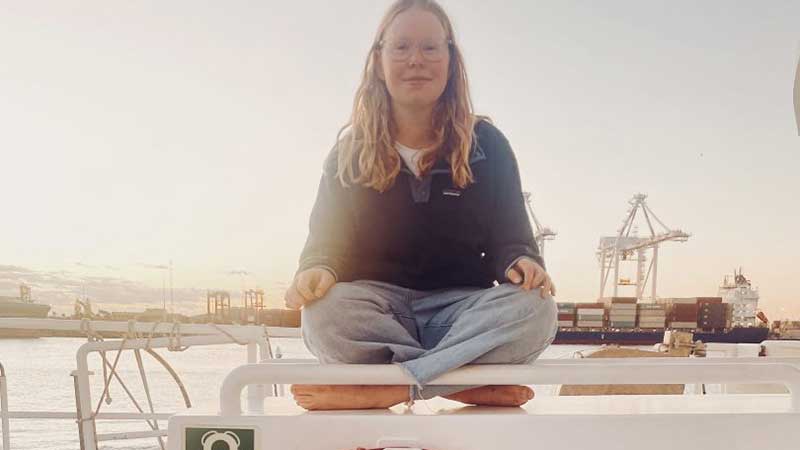
5 May 2023
Meet Emma from School Strike 4 Climate
We spoke with Emma from School Strike 4 Climate on Thursday when she visited the Rainbow Warrior in Fremantle during its Whales Not Woodside Ship Tour to learn more about how she became involved in climate activism, what motivates her, and get her thoughts on Meg O’Neil and Woodside’s Burrup Hub gas expansion.
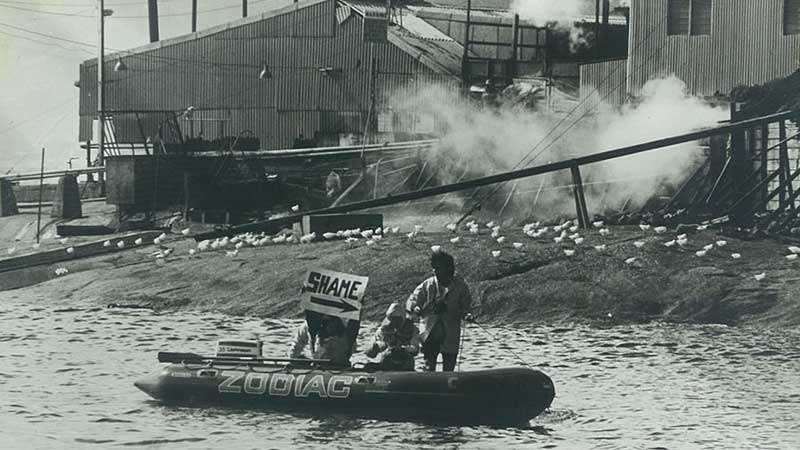
4 May 2023
Greenpeace and the end of whaling in Albany
The end of whaling in Albany marked a turning point in the fight to protect whales from extinction. In the 1970s, the greatest threat to whales was whaling. Now the greatest threat comes from fossil fuel companies like Woodside who are driving dangerous climate change.
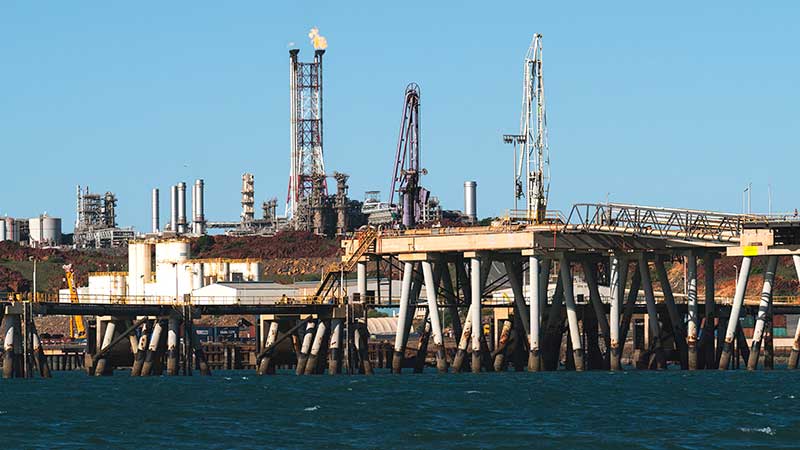
22 November 2022
What is the Safeguard Mechanism?
The Safeguard Mechanism was introduced in 2016 by the Tony Abbot government. It applies to Australia’s biggest polluters - largely gas, coal, mining and manufacturing - and was supposed to stop climate change by limiting the amount of dirty greenhouse gasses they pump out. It was, to put it mildly, a disaster.
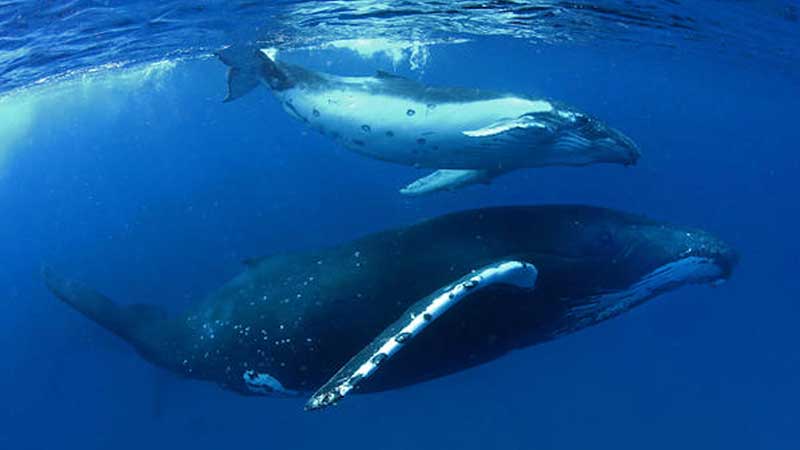
11 November 2022
Submit your comment to help stop Woodside’s climate destruction
We just heard that Tanya Plibersek, the federal Environment Minister, is reviewing Woodside’s bid to extend its dirty gas processing facility to 2070. That means we have until 24 November to flood the environment department with public comments on the dangerous climate impacts of Woodside’s North West Shelf.
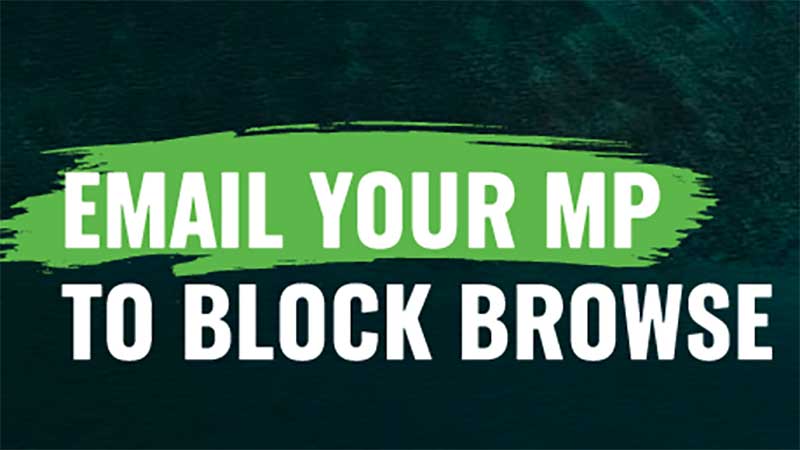
19 October 2022
Ask your MPs and Senators to #BlockBrowse
Woodside Energy has just asked the government to approve its plans for Browse, a monstrous gas field it wants to exploit off the coast of Broome. We only have a small window of time before Tanya Plibersek, the federal environment minister, decides whether to approve it – it's time to take action!
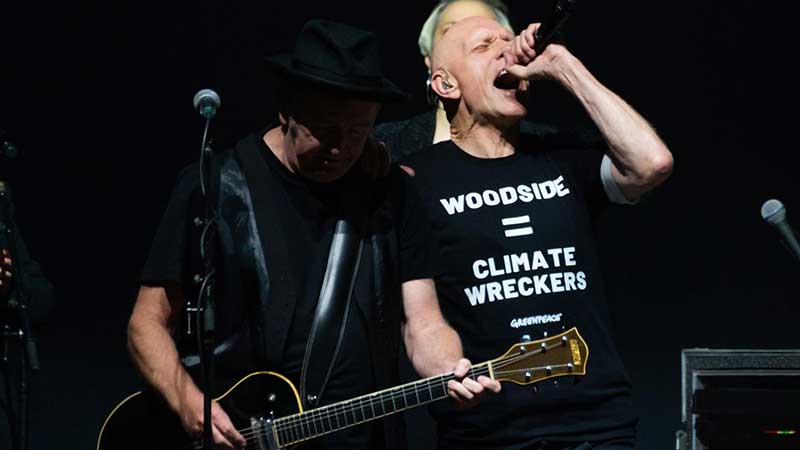
13 October 2022
Woodside’s Browse project is a climate wrecker
Iconic protest band Midnight Oil had a stellar mic drop moment against Woodside. Playing to full crowds in Perth, Canberra, and Sydney, with Woodside management and politicians in attendance, the rock legends stopped their show mid-way through to slam Woodside’s Burrup Hub gas project – and its newest phase, Browse.
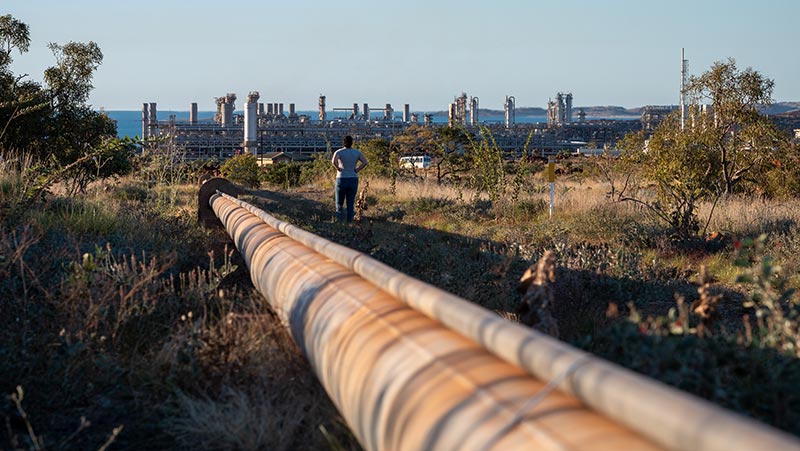
31 January 2022
As Western Australia sweats, Woodside rushes on Scarborough
Temperatures in the Pilbara, in the north of Western Australia, soared to a record-breaking 50.7˚C earlier this month. Since then, Woodside and their CEO Meg O’Neill have been ruffling together the financiers and construction partners to begin work on Scarborough: a deep sea gas drilling project that would pump gas back to those same shores, and create more climate pollution than any other Australian fossil fuel project.
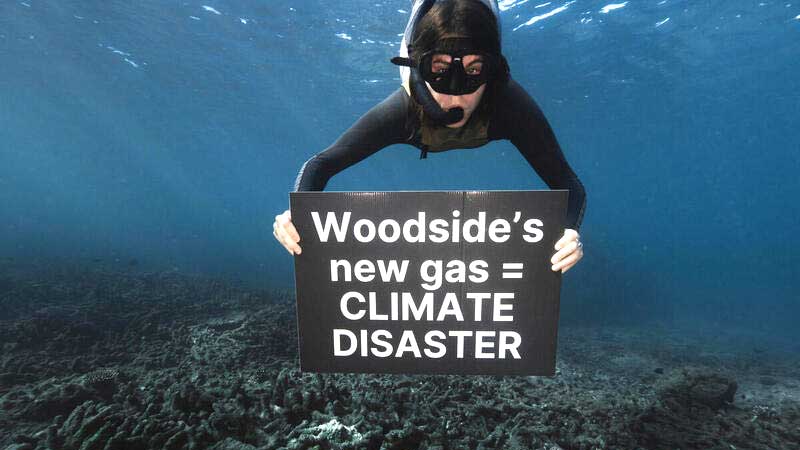
26 August 2021
What is the North West Shelf – and why does it matter?
You might have heard us celebrating a record number of appeals lodged last month against Woodside’s North West Shelf extension to 2070. So what does it all mean, and why does it matter?
Spread the word
Greenpeace is 100% funded by people just like you
Did you know: We don’t take any money from government or corporations, allowing us to stay fiercely independent in our fight for a greener, more peaceful future.

